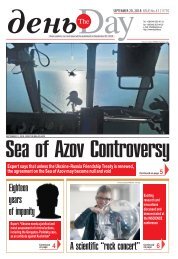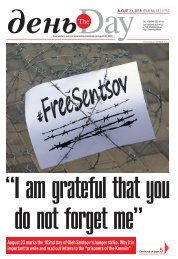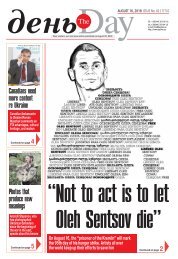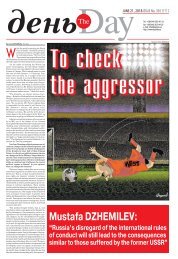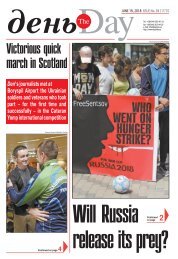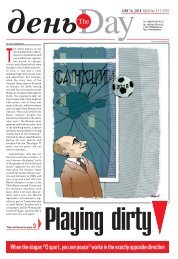Create successful ePaper yourself
Turn your PDF publications into a flip-book with our unique Google optimized e-Paper software.
WWW.DAY.KIEV.UA<br />
DAY AFTER DAY No.20 MARCH 29, 2018 3<br />
Missiles against hatred and lies<br />
By Natalia ISHCHENKO<br />
March 24 marks the 19th<br />
anniversary of start of the<br />
NATO bombing campaign<br />
in the former Yugoslavia.<br />
Ukrainians know very<br />
little about the circumstances of those<br />
events. Information that we do have is<br />
often incomplete, often distorted, and<br />
sometimes absent at all.<br />
One of the little-known episodes is<br />
the bombing of the Radio and Television<br />
of Serbia (RTS) in April 1999.<br />
This attack was not a mistake. The<br />
RTS building in Belgrade was hit by a<br />
missile because the broadcaster was<br />
part of the propaganda machine of the<br />
then Yugoslav authorities, a weapon<br />
in the war waged by the regime of Slobodan<br />
Milosevic.<br />
● MILOSEVIC’S<br />
RESPONSIBILITY<br />
The Federal Republic of Yugoslavia<br />
(FRY, then including Serbia<br />
and Montenegro) was attacked because<br />
the Yugoslav leadership made<br />
sure that the peace talks on the resolution<br />
of the conflict in Kosovo failed.<br />
The negotiation process, which lasted<br />
from February to March 1999 in Rambouillet<br />
and Paris (France), was suspended<br />
on March 19. The parties could<br />
not reach an agreement, since president<br />
of the FRY Milosevic refused to<br />
sign military annexes to the crisis settlement<br />
treaty. Meanwhile, the number<br />
of Albanian refugees from Kosovo<br />
continued to increase...<br />
Javier Solana, then secretary<br />
general of NATO, made a special<br />
press statement on March 24, 1999,<br />
in connection with the start of the<br />
air operations. In particular, he<br />
said: “In the last months, the international<br />
community has spared no<br />
efforts to achieve a negotiated solution<br />
in Kosovo. But it has not been<br />
possible.<br />
“Clear responsibility for the air<br />
strikes lies with President Milosevic<br />
who has refused to stop his violent action<br />
in Kosovo and has refused to negotiate<br />
in good faith.<br />
“The time has now come for action.<br />
“Let me reiterate: NATO is not<br />
waging war against Yugoslavia.<br />
“We have no quarrel with the people<br />
of Yugoslavia who for too long<br />
have been isolated in Europe because<br />
of the policies of their government.<br />
“Our actions are directed against<br />
the repressive policy of the Yugoslav<br />
leadership.<br />
“We must stop the violence and<br />
bring an end to the humanitarian catastrophe<br />
now taking place in Kosovo.<br />
We have a moral duty to do so.”<br />
● 78 DAYS AND NIGHTS<br />
The Operation Allied Force began<br />
without the formal consent of the UN<br />
Security Council and lasted 78 days.<br />
During that time, the North Atlantic<br />
Alliance carried out air strikes with<br />
cruise missiles and aircraft against<br />
hundreds of targets in Serbia and<br />
How Slobodan Milosevic’s “propaganda machine” was attacked by NATO<br />
Montenegro. They were mostly military,<br />
industrial, and infrastructure<br />
facilities. According to various estimates,<br />
more than two and a half<br />
months of bombing killed 1,200 to<br />
2,500 people. The total property damage<br />
is estimated at tens of billions of<br />
dollars.<br />
The operation ended with the<br />
signing of a military technical agreement<br />
in Kumanovo (Macedonia) on<br />
June 9, 1999. Three days later, the<br />
withdrawal of the FRY forces from<br />
Kosovo began.<br />
The NATO secretary general issued<br />
an order to stop the bombing on<br />
June 10, and the last missile exploded<br />
at 1:30 a.m. that day.<br />
On June 10, 1999, the UN Security<br />
Council adopted Resolution<br />
1244, and 37,800 Kosovo Force<br />
REUTERS photo<br />
“<br />
The isolated ruined buildings in the center of Belgrade, which have been<br />
specially left unaltered since 1999, remind the Serbs and should remind everyone<br />
else what happens when an authoritarian ruler wants to build a “great country”<br />
over the objections of the international community, by brainwashing people with<br />
propaganda and carrying out military aggression against other peoples.<br />
”<br />
tified, since they were part of the<br />
“apparatus of the dictatorship and<br />
power of Milosevic.”<br />
(KFOR) troops from 36 countries<br />
were sent to Kosovo.<br />
The international peacekeeping<br />
mission in Kosovo continues to this<br />
day.<br />
● BOMBING THE<br />
“PROPAGANDIST MACHINE”<br />
One of the significant episodes of<br />
the Allied Force operation was the<br />
bombing of the RTS. On April 23,<br />
1999, a cruise missile launched by a<br />
NATO aircraft hit the RTS building in<br />
Belgrade. Three TV channels and four<br />
radio stations then broadcast from the<br />
home of the region’s leading broadcaster.<br />
The attack took place at night, at<br />
2:06 a.m., just when Milosevic’s<br />
recorded interview was being broadcast<br />
on the central channel. Two of the<br />
four floors of the RTS building col-<br />
The publication also quoted a<br />
statement by UK International Development<br />
Secretary Clare Short: “This<br />
is a war, this is a serious conflict, untold<br />
horrors are being done. The propaganda<br />
machine is prolonging the war<br />
and it [the RTS building] is a legitimate<br />
target.”<br />
Admiral Ian Garnett, chief of<br />
joint operations at the Ministry of Defense,<br />
noted that Milosevic’s “propaganda<br />
machine consists of transmitters<br />
but also the studios from which<br />
the information is transmitted. That<br />
makes it part of the overall military<br />
structure. Both elements have to be<br />
attacked.”<br />
And NATO spokesman David Wilby,<br />
according to The Guardian, called<br />
lapsed, the main instrument room was<br />
destroyed, 150 to 200 people (who<br />
worked the night shift or were on duty)<br />
were then present in the broadcaster’s<br />
building. As a result of the<br />
bombing, 16 RTS staff were killed, including<br />
directors, editors, programmers,<br />
cameramen, guards, a makeup<br />
artist... More people were injured, and<br />
then rescued out of the rubble of the<br />
destroyed building.<br />
Representatives of NATO and its<br />
member countries asserted that the<br />
RTS was a dual purpose object, which<br />
made an important contribution to the<br />
propaganda war being conducted then<br />
by the Yugoslav authorities.<br />
The Guardian newspaper quoted<br />
Tony Blair in 1999, immediately after<br />
the attack, who insisted that the<br />
bombing of TV stations was fully justhe<br />
Serbian state broadcaster two<br />
weeks before the attack “a legitimate<br />
target,” because it “filled the airwaves<br />
with hate and with lies over the<br />
years.”<br />
● WHO IS TO BLAME?<br />
International journalist unions and<br />
TV broadcaster associations were, as<br />
expected, extremely negative about the<br />
news from Belgrade. Human rights organizations<br />
Amnesty International and<br />
Human Rights Watch (HRW), in turn,<br />
criticized the Alliance for attacking the<br />
Serbian broadcaster due to the deaths of<br />
civilians. However, the HRW cited in its<br />
report on the Kosovo crisis, posted on the<br />
official website of the organization<br />
(https://www.hrw.org/reports/2000/na<br />
to/Natbm200-01.htm#P420_111626)<br />
Paragraph 7 of the 1956 Guidelines of<br />
the International Committee of the Red<br />
Cross, which lists among legitimate<br />
military objectives “installations of<br />
broadcasting and television stations”<br />
(the source referenced by the human<br />
rights activists is ICRC, Commentary on<br />
the Additional Protocols, p. 632, para.<br />
2002, note 3).<br />
In 2001, the European Court of<br />
Human Rights declared inadmissible<br />
for consideration of the merits a complaint<br />
lodged by relatives of several<br />
dead and wounded RTS workers<br />
against NATO members who participated<br />
in the bombing.<br />
Other international tribunals also<br />
found no grounds for opening cases<br />
against the countries participating in<br />
the Allied Force operation. In June<br />
1999, the UN International Court of<br />
Justice refused to comply with the request<br />
of the FRY to institute proceedings<br />
against the allies. In 2000, the<br />
prosecutor of the International Criminal<br />
Tribunal for the former Yugoslavia<br />
informed the UN Security<br />
Council of his decision not to conduct<br />
an investigation into this issue.<br />
Instead, in 2002 (two years after<br />
the overthrow of the Milosevic<br />
regime), the Serbian court sentenced<br />
the former head of state radio television<br />
Serbia Dragoljub Milanovic to<br />
10 years imprisonment because he<br />
did not ensure the safety of his employees.<br />
According to the HRW, Western<br />
media organizations that used the facilities<br />
of the Serbian broadcaster for<br />
the transfer of materials from Yugoslavia<br />
were warned by NATO representatives<br />
that the headquarters of<br />
the RTS would be attacked. As soon as<br />
Western media learned about the Alliance’s<br />
plans, the authorities of Yugoslavia<br />
also received relevant information.<br />
But as the court found, the<br />
head of the RTS deliberately did not<br />
comply with the evacuation order for<br />
TV and radio workers, although he<br />
knew that the RTS building could become<br />
a target for bombing.<br />
Dragoljub Milanovic was released<br />
in August 2012. He takes an active<br />
part in social and political life, speaks<br />
on TV and recalls the old times. He<br />
tried to sue journalists who wrote that<br />
he “sacrificed 16 employees of the<br />
RTS” in 1999. He has been unsuccessful<br />
so far: in the beginning of this<br />
year, the Supreme Court of Cassation<br />
of Serbia decided that such a value<br />
judgment was based on a court decision<br />
and did not detract from the honor<br />
and reputation of the former chief<br />
manager of the main Serbian broadcaster.<br />
● LEARNED AND UNLEARNED<br />
LESSONS<br />
As far as the RTS itself is concerned,<br />
it has... repented. On May 23,<br />
2011, the RTS management apologized<br />
to the citizens of the country<br />
and residents of the region for the fact<br />
that in the 1990s, the RTS programs<br />
contained insults, slander, and incitement<br />
to hatred and hostility.<br />
The media company acknowledged<br />
that this was happening to discredit<br />
the political opposition in Serbia and<br />
its leaders, and was also part of propaganda<br />
of the then undemocratic<br />
regime. The RTS executives stated<br />
that programs of the broadcaster<br />
harmed honor and dignity of representatives<br />
of the political opposition,<br />
critically-minded journalists, humanist-oriented<br />
intellectuals, ethnic and<br />
religious minorities in Serbia, as well<br />
as some of the neighboring peoples<br />
and nations in the 1990s.<br />
The new RTS has pledged to be independent<br />
in its work and implement<br />
the principles of rule of law, social justice,<br />
and civic democracy, protect human<br />
rights and minority rights, and<br />
devotedly observe European principles<br />
and values.<br />
In general, today’s Serbia strives<br />
to behave in a European manner. In<br />
particular, it aims to resolve all the<br />
conflicts – including old ones, first of<br />
all, the settlement of the Kosovo situation<br />
– through negotiations and<br />
agreements. The isolated ruined buildings<br />
in the center of Belgrade, which<br />
have been specially left unaltered since<br />
1999, remind the Serbs and should remind<br />
everyone else what happens<br />
when an authoritarian ruler wants to<br />
build a “great country” over the objections<br />
of the international community,<br />
by brainwashing people with propaganda<br />
and carrying out military aggression<br />
against other peoples.




